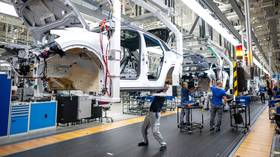EU car industry faces a ‘horror fall’ – Bild

EU automakers are facing their worst months since the Covid-19 pandemic, the German tabloid Bild reported on Thursday, citing a prominent industry expert.
Car sales within the bloc have fallen by 200,000 vehicles in the first eight months of 2024 compared to the same period last year and things are set to get worse, Ferdinand Dudenhoeffer told the outlet.
Dudenhoeffer is the founder and former director of the Center for Automotive Research (CAR) – a private institute specializing in industry analysis and transport policy.
Sales of electric cars are down 8.3% from last year, the economist pointed out, with 140,000 fewer models sold through August.
”Important large car markets such as Germany and Italy were already slightly down in the first eight months of the year,” he noted, warning that things “are not getting better.”
According to Dudenhoeffer, car manufacturers are now seeking to compensate for their losses by increasing prices. The 20 most popular gasoline-powered car models are already approximately 10% more expensive, he told Bild.
“The next few months will be very difficult for the industry. Worse than it was during [the Covid-19 pandemic],” he predicted. Germany is about to be hit particularly strongly, according to the expert, with the market not expected to recover before 2026.
Last month, the EU’s biggest carmaker – Volkswagen – announced that it would consider plant closures or layoffs in Germany for the first time in its 87-year history. The company also announced it would be forced to end its employment security program, which had been set up to postpone all job cuts until at least 2029.
In early September, Volkswagen Group CEO Oliver Blume called the situation the automobile market was facing “highly challenging and serious,” adding that the possibility of “plant closures are no longer excluded.” The company management did not specify how many of the company’s 120,000 employees in Germany would be laid off.
Germany had already suffered a recession in late 2023. Europe’s largest economy also contracted in the second quarter of this year, according to official statistics. Weakness in the automotive sector became the main driver behind the decline in the country’s industrial production in July, Reuters reported in September, adding that the nation could face another recession.














